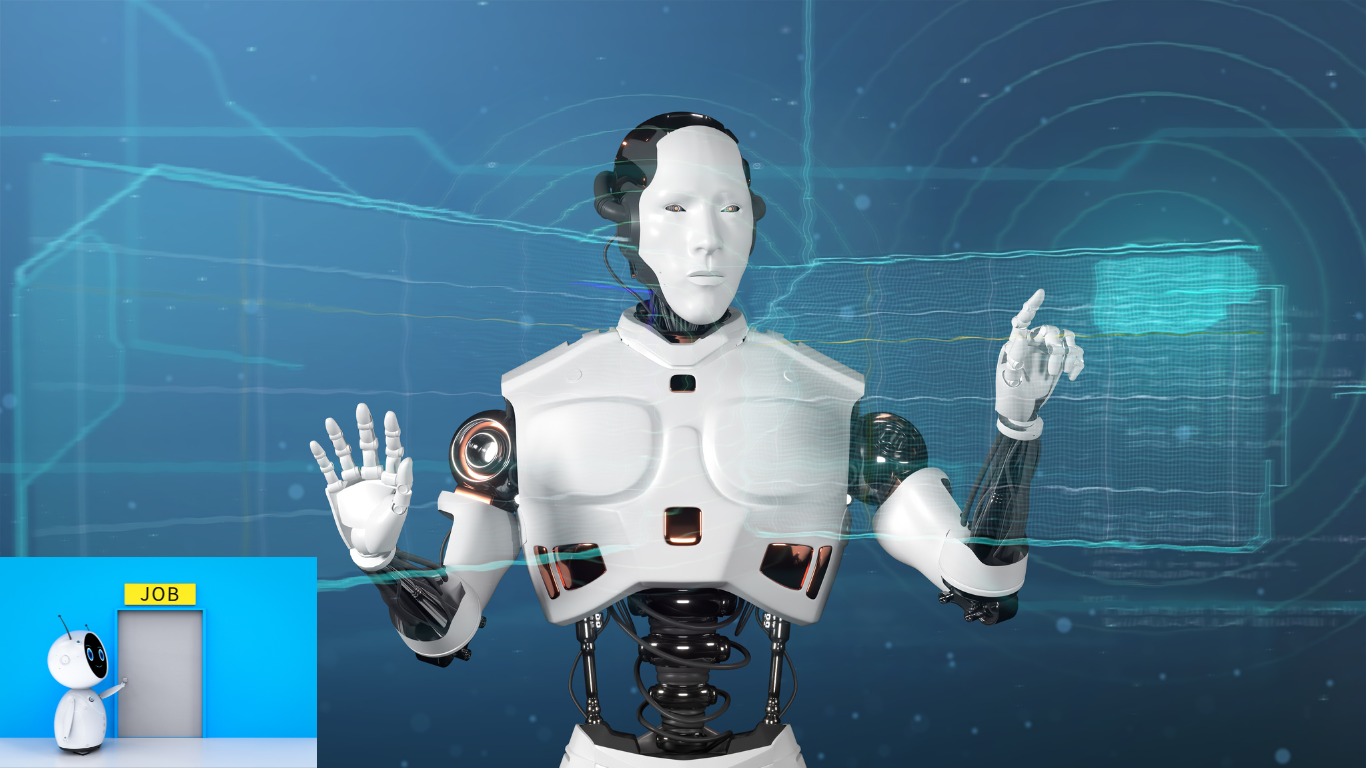In recent years, Artificial Intelligence (AI) has emerged as a transformative force reshaping industries and professions worldwide. From automating mundane tasks to offering insights from vast datasets, AI’s influence is vast and multifaceted. The job market is no exception. As AI technologies evolve, they are changing how we work, the skills required, and even the jobs available. This shift presents both challenges and opportunities for tech enthusiasts, technology users, and job seekers. In this post, we will explore how AI is changing the job market, examining its impact across various sectors, the skills now in demand, and how workers can adapt to this evolving landscape.
Table of Contents
1. The Impact of AI on Job Roles and Industries
AI’s ability to automate and optimize processes is revolutionizing many industries. Sectors like manufacturing, healthcare, finance, and retail are experiencing significant changes in their workforce dynamics due to AI adoption. For instance, in manufacturing, AI-driven robots can now handle repetitive tasks, reducing the need for manual labor. According to a report by McKinsey Global Institute, nearly 50% of the activities people are paid to perform in the global economy could theoretically be automated by adapting currently demonstrated technologies.
AI is transforming job roles in the healthcare industry by improving diagnostic capabilities. For instance, radiologists are now collaborating with AI systems that can analyze medical images more quickly and, in certain instances, with higher precision than human practitioners. As a result, their attention has shifted from routine image analysis to the management of more intricate cases and patient care. This illustrates a pattern where AI doesn’t replace jobs, but rather brings about their transformation.
2. AI and the Rise of New Job Categories
While AI is automating certain tasks, it is also creating new job categories. The demand for AI specialists, data scientists, machine learning engineers, and robotics technicians is rising. LinkedIn’s 2024 Emerging Jobs Report revealed that AI Specialist roles have grown by 74% annually over the past four years. Companies are actively seeking professionals who can develop, manage, and improve AI systems.
Moreover, the integration of AI across different sectors has led to the emergence of hybrid roles that combine domain expertise with AI skills. For instance, a financial analyst today might also need to understand machine learning models to interpret predictive analytics data. This blending of traditional roles with new technological skills is reshaping the job market and creating a demand for continuous learning and adaptation.
3. The Shift in Skill Demand: From Routine to Digital and Soft Skills
As AI automates routine tasks, there is a growing emphasis on skills that AI cannot easily replicate. The World Economic Forum‘s Future of Jobs Report 2024 indicates a rising demand for digital skills such as data analysis, AI, machine learning, and software development. Furthermore, soft skills like critical thinking, creativity, emotional intelligence, and complex problem-solving are becoming increasingly valuable. These skills enable workers to perform tasks that require human judgment, empathy, and innovation—areas where AI currently lacks proficiency.
For example, customer service roles are evolving. AI-powered chatbots handle basic inquiries, but human agents are needed to manage more complex, emotionally charged interactions. This shift requires customer service professionals to develop advanced communication skills and a deeper understanding of customer psychology.
4. AI-Driven Inequality and Job Displacement Concerns
Despite the opportunities AI creates, there are concerns about job displacement and increased inequality. Lower-skilled jobs, particularly in sectors like retail, transportation, and administrative support, are most at risk of automation. According to the Brookings Institution, approximately 25% of U.S. jobs are at high risk of automation, with a further 36% at medium risk.
This trend raises questions about the socioeconomic impact of AI, particularly for workers who may not have the skills to transition to new roles. For example, truck drivers face uncertainty as autonomous vehicle technology advances. While these technologies can improve efficiency and safety, they also threaten jobs that provide livelihoods for millions of people globally.
5. AI’s Role in Enhancing Workforce Productivity
AI is not just about automation—it also enhances workforce productivity. AI tools can streamline processes, reduce human error, and provide insights that drive better decision-making. In the legal industry, AI-powered software can review and analyze vast amounts of legal documents, allowing lawyers to focus on more strategic aspects of their work, such as client counseling and case strategy development.
Similarly, in marketing, AI algorithms analyze consumer data to personalize content, optimizing marketing strategies and improving engagement rates. AI’s role in enhancing productivity demonstrates its potential to augment rather than replace human labor, shifting the focus from repetitive tasks to more strategic, creative, and value-adding activities.
6. Real-World Examples of AI Integration in the Workplace
Several companies are leading the way in integrating AI into their workflows. Amazon, for instance, uses AI-driven robots in its warehouses to sort packages and streamline the logistics process, improving efficiency and reducing the need for manual sorting. At the same time, Amazon invests heavily in retraining programs to help its workforce adapt to new roles created by AI and automation.
Another example is IBM, which has developed AI-powered HR tools that assist in talent management by predicting employee retention rates and identifying skill gaps. This allows HR professionals to focus on strategic initiatives like talent development and employee engagement rather than administrative tasks.
7. Adapting to the AI-Driven Job Market: Strategies for Workers (AI is Changing the Job Market)
As AI continues to reshape the job market, workers must proactively adapt to stay relevant. Here are some actionable tips for integrating AI technologies into jobs and careers:
- Continuous Learning and Upskilling: Stay informed about the latest developments in AI and related technologies. Online platforms like Coursera, Udacity, and edX offer courses in AI, machine learning, and data science. Acquiring these skills can open doors to new opportunities in the evolving job market.
- Embrace Digital Literacy: Develop a solid understanding of digital tools and platforms. Familiarize yourself with data analysis software, AI applications, and other digital tools relevant to your industry. This knowledge will be increasingly valuable as AI becomes more integrated into various professions.
- Cultivate Soft Skills: Focus on enhancing soft skills that AI cannot easily replicate. Skills such as critical thinking, creativity, leadership, and emotional intelligence will remain essential in a job market increasingly dominated by AI.
- Adaptability and Flexibility: Be prepared to adapt to new roles and responsibilities as AI technologies evolve. Flexibility is key to thriving in a dynamic job market. Consider gaining experience in different areas within your field to broaden your skill set.
- Leverage AI Tools: Familiarize yourself with AI tools that can enhance your productivity and efficiency. For example, marketers can use AI-driven analytics tools to gain insights into consumer behavior, while HR professionals can use AI for talent management and recruitment.
- Stay Informed About AI Ethics and Implications: Understanding the ethical implications of AI is crucial for navigating the future job market. Stay informed about AI’s potential impacts on privacy, security, and employment to make informed career decisions and advocate for responsible AI use in your organization.
Conclusion
Indeed, AI is changing the job market, bringing both challenges and opportunities. As AI technologies continue to evolve, they will reshape job roles, create new opportunities, and demand new skills. By staying informed, continuously learning, and adapting to these changes, workers can thrive in an AI-driven job market. Embracing AI’s potential while remaining aware of its implications will be key to navigating the future of work. As we move forward, it is essential to remember that while AI may transform jobs, the human element—creativity, empathy, and innovation—will remain irreplaceable.



https://t.me/s/Top_BestCasino/154